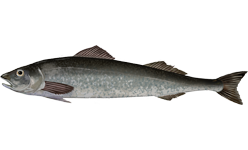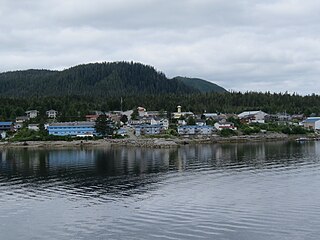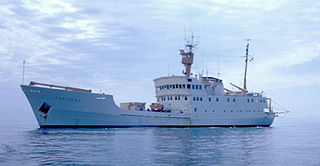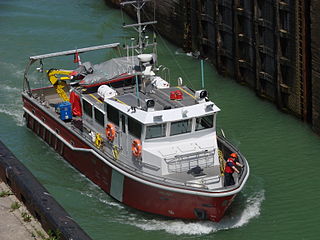Other uses
- Dungeon Fighter Online , a 2009 computer game
DFO may refer to:

The Miꞌkmaq are a First Nations people of the Northeastern Woodlands, indigenous to the areas now known as Canada's Atlantic Provinces and the Gaspé Peninsula of Quebec as well as the northeastern region of Maine. They call their national territory Miꞌkmaꞌki. The nation has a population of about 170,000, of whom nearly 11,000 speak Miꞌkmaq, an Eastern Algonquian language. Once written in Miꞌkmaw hieroglyphic writing, it is now written using most letters of the Latin alphabet.

The Canadian Coast Guard is the coast guard of Canada. Formed in 1962, the coast guard is tasked with marine search and rescue (SAR), communication, navigation, and transportation issues in Canadian waters, such as navigation aids and icebreaking, marine pollution response, and support for other Canadian government initiatives. The coast guard operates 119 vessels of varying sizes and 23 helicopters, along with a variety of smaller craft. The CCG is headquartered in Ottawa, Ontario, and is a special operating agency within Fisheries and Oceans Canada.

The sablefish is one of two members of the fish family Anoplopomatidae and the only species in the genus Anoplopoma. In English, common names for it include sable (US), butterfish (US), black cod, blue cod (UK), bluefish (UK), candlefish (UK), coal cod (UK), snowfish (ปลาหิมะ) (Thailand), coalfish (Canada), beshow, and skil (Canada), although many of these names also refer to other, unrelated, species. The US Food and Drug Administration accepts only "sablefish" as the Acceptable Market Name in the United States; "black cod" is considered a vernacular (regional) name and should not be used as a Statement of Identity for this species. The sablefish is found in muddy sea beds in the North Pacific Ocean at depths of 300 to 2,700 m and is commercially important to Japan.
Fisheries and Oceans Canada, is a department of the Government of Canada that is responsible for developing and implementing policies and programs in support of Canada's economic, ecological and scientific interests in oceans and inland waters. Its mandate includes responsibility for the conservation and sustainable use of Canada's fisheries resources while continuing to provide safe, effective and environmentally sound marine services that are responsive to the needs of Canadians in a global economy.

Bella Bella, also known as Waglisla, is the home of the Heiltsuk and is an unincorporated community and Indian Reserve community located within Bella Bella Indian Reserve No. 1 on the east coast of Campbell Island in the Central Coast region of British Columbia, Canada. Bella Bella is located 98 nautical miles (181 km) north of Port Hardy, on Vancouver Island, and 78 nautical miles (144 km) west of Bella Coola. The community is on Lama Passage, part of the Inside Passage – a transportation route linking the area, and northern British Columbia as well as Alaska for marine vessels carrying cargo, passengers and recreational boaters from the south coast.

CCGS Parizeau was a Canadian Coast Guard research vessel that served from 1967 to 2001. Initially serving on the West Coast of Canada from 1967 to 1991, in 1992, the ship transferred to the East Coast of Canada. Taken out of service in 2004, the ship was later sold and converted to a yacht and unsuccessfully used for drug smuggling as Destiny Empress.

The National Socialist Women's League was the women's wing of the Nazi Party. It was founded in October 1931 as a fusion of several nationalist and Nazi women's associations, such as the German Women's Order which had been founded in 1926. From then on, women were subordinate to the NSDAP Reich leadership. Girls and young women fell under the jurisdiction of the Association of German Girls (BDM). Guida Diehl was its first speaker (Kulturreferenotin).
Direct Factory Outlet (DFO) is a group of factory outlet shopping centres in Australia. They are large-floor warehouse buildings containing partitioned stores where retail outlets sell excess or previous seasons' stocks at reduced prices.

The Laurentian Channel is a deep submarine valley off the coast of eastern Canada in the Gulf of Saint Lawrence.

Luna also known as L98 or Tsux'iit, was a killer whale (orca) born in Puget Sound. After being separated from his mother while still young, Luna spent five years in Nootka Sound, an ocean inlet of western Vancouver Island, where he had extensive human contact and became recognized internationally.

Canada's fishing industry is a key contributor to the success of the Canadian economy. In 2016, Canada's fishing industry exported $6.6 billion in fish and seafood products and employed approximately 72,000 people in the industry. Aquaculture, which is the farming of fish, shellfish, and aquatic plants in fresh or salt water, is the fastest growing food production activity in the world and a growing sector in Canada. In 2015, aquaculture generated over $1 billion in GDP and close to $3 billion in total economic activity. The Department Of Fisheries and Oceans (DFO) oversees the management of Canada's aquatic resources and works with fishermen across the country to ensure the sustainability of Canada's oceans and in-land fisheries.

In 1992, Northern Cod populations fell to 1% of historical levels, due in large part to decades of overfishing. The Canadian Federal Minister of Fisheries and Oceans, John Crosbie, declared a moratorium on the Northern Cod fishery, which for the preceding 500 years had primarily shaped the lives and communities of Canada's eastern coast. A significant factor contributing to the depletion of the cod stocks off Newfoundland's shores was the introduction of equipment and technology that increased landed fish volume. From the 1950s onwards, new technology allowed fishers to trawl a larger area, fish more in-depth, and for a longer time. By the 1960s, powerful trawlers equipped with radar, electronic navigation systems, and sonar allowed crews to pursue fish with unparalleled success, and Canadian catches peaked in the late-1970s and early-1980s. Cod stocks were depleted at a faster rate than could be replenished.

Canadian aquatic invasive species are all forms of life that traditionally has not been native to Canada's waterways. In Eastern Canada, non-native plant and animal species are a concern to biologists. Bringing non-native species such as invasive fishes into Canada can damage the environment and ecosystem by repressing native species due to food competition or preying. Invasive fishes enter the fresh waters of Canada in several ways including drifting, deliberate introduction, accidental release, experimental purposes and, most commonly, through the attachment on international boat hulls. Invasive species are the second biggest threat to fish and other marine life in Canada behind loss of habitat and degradation. The threat to native species is primarily caused by impacts on the food web; however, invasive species also bring dangerous pathogens and physically interfere with existing aquatic life. Invasive species include sea lampreys, zebra mussels, smallmouth bass, European green crab, vase tunicate, and sea squirts.
Dairy Farmers of Ontario (DFO), is the marketing organization and regulatory body representing over 4,000 dairy farmers in Ontario, Canada. DFO was formerly known as the Ontario Milk Marketing Board (OMMB), which was established as result of the 1965 Ontario Milk Act. On August 1, 1995 the Ontario Milk Marketing Board and the Ontario Cream Producers' Marketing Board merged to form Dairy Farmers of Ontario.

Aquaculture is the farming of fish, shellfish or aquatic plants in either fresh or saltwater, or both. The farmed animals or plants are cared for under a controlled environment to ensure optimum growth, success and profit. When they have reached an appropriate size, they are harvested, processed, and shipped to markets to be sold. Aquaculture is practiced all over the world and is extremely popular in countries such as China, where population is high and fish is a staple part of their everyday diet.
SK DFO Pardubice was a Czech women's football team from Pardubice, lastly played in the 2017–18 Czech Second Division. The club's best finish is 7th place in the First Division, which it achieved in the 2008–09 season. Team merged with FK Pardubice in 2018.

ABCO Industries is located on the waterfront of the UNESCO World Heritage Site-designated port town of Lunenburg, Nova Scotia.

The ice jigger also known as prairie ice jigger, or prairie jigger, is a device for setting a fishing net under the ice between two ice holes, invented by indigenous fishermen of Canada in early 1900s.

Marine Protected Areas (MPAs) are zones within Canadian waters where the marine environment enjoys a high level of environmental protection. Marine Protected Areas are governed by the Oceans Act of 1996 and administered by Fisheries and Oceans Canada.
In marine geology, a knoll is defined as a rounded underwater hill, not exceeding 1000 meters in height. Any rounded underwater features exceeding that height are referred to as seamounts. They are believed to cover around 16.3% of the world's seafloor.